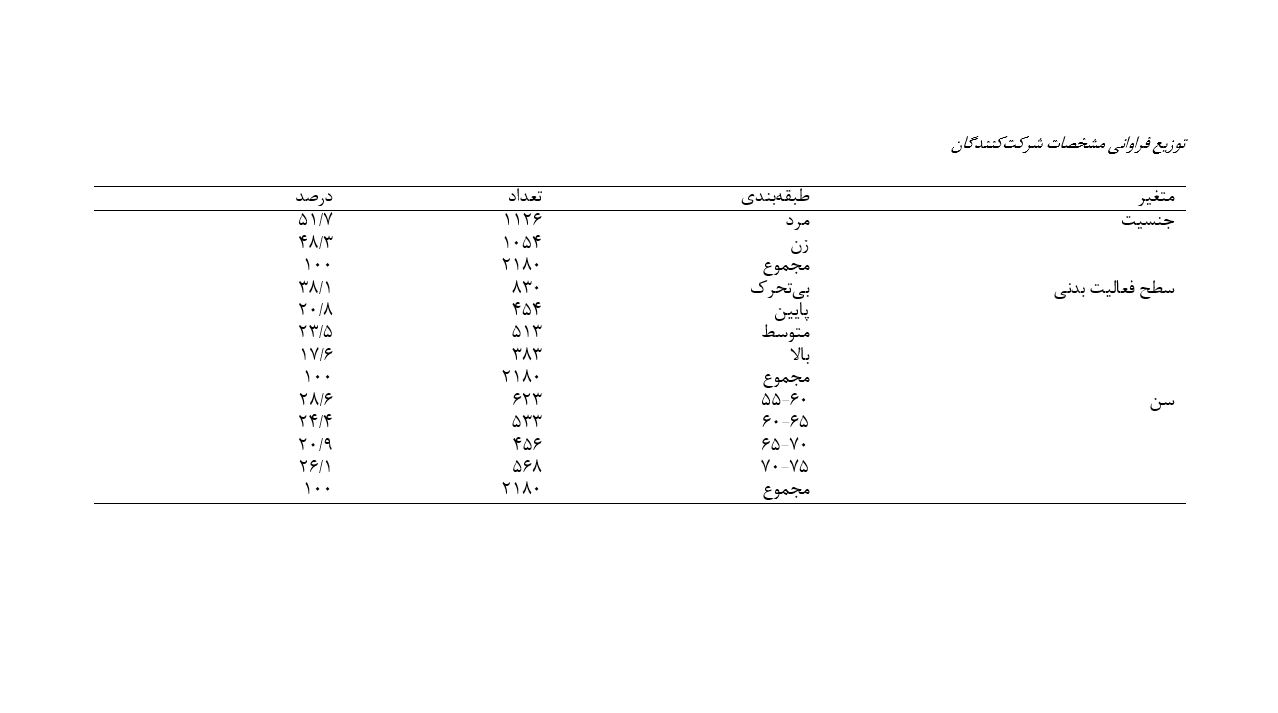The Cognitive Triad in Iranian Older Adults: Emphasis on Sleep Quality and Physical Activity Levels
Keywords:
فعالیت بدنی, کیفیت خواب, مثلث شناختی, سالمندانAbstract
This study aimed to systematically investigate the simultaneous effects of physical activity level and sleep quality on cognitive-emotional functions in Iranian older adults. The research employed a cross-sectional descriptive design with multi-stage random cluster sampling. The statistical population consisted of 2,180 adults aged over 60 years from five geographical regions of Iran. Data collection tools included the Cognitive Triad Inventory (CTI), the Pittsburgh Sleep Quality Index (PSQI), and the CHAMPS Physical Activity Questionnaire for Older Adults. Results of the two-way multivariate analysis of variance (MANOVA) indicated that the main effects of physical activity level, sleep quality, and their interaction on the subscales of the cognitive triad in older adults were significant. Post hoc test results revealed that increased physical activity, regardless of sleep quality, was associated with improved self-perception among older adults (P = 0.001). Regarding worldview, the only significant difference was observed between sedentary and inactive groups with poor sleep quality (P = 0.05). More importantly, in older adults with poor sleep quality, higher physical activity was related to a more positive future outlook (P ≤ 0.05), whereas this relationship was not significant in the good sleep quality group. Findings showed that both physical activity (η² = 0.054) and sleep quality (η² = 0.058) had independent moderate effects on the subscales of the cognitive triad, while the interaction effect was stronger (η² = 0.1), accounting for a substantial proportion of the variance. This study suggests that physical activity can serve as a moderating factor in the relationship between sleep quality and cognitive attitudes in older adults. Specifically, in those with poor sleep quality, increased physical activity was associated with improved self-perception and future outlook, highlighting the importance of incorporating exercise programs into mental health interventions for this population. The findings support the development of targeted combined programs that address both sleep improvement and physical activity enhancement.
References
1. Asghari, N., Maddahi, M. E., Keraskian Mojmenari, A., & Sahhaf, R. (2020). The effectiveness of cognitive-behavioral group therapy (CBT) on psychological symptoms (depression and psychological well-being) in the elderly. Journal of Excellence in Counseling and Psychotherapy, 8(32), 45–58.
2. Chang, S., Cheng, L., & Liu, H. (2024). Effects of three-duration Tai-Chi exercises on depression and sleep quality in older women. European Geriatric Medicine, 15, 1141–1148. https://doi.org/10.1007/s41999-024-00981-4
3. Dong, Y., Zhang, X., Zhao, R., Cao, L., Kuang, X., & Yao, J. (2024). The effects of mind-body exercise on anxiety and depression in older adults: A systematic review and network meta-analysis. Frontiers in Psychiatry, 15, 1305295. https://doi.org/10.3389/fpsyt.2024.1305295
4. Gu, S., & Liu, S. (2025). A serial mediation model of physical exercise and loneliness: The role of frailty and depression. BMC Geriatrics, 25, 350. https://doi.org/10.1186/s12877-025-05988-5
5. Javanmardi, F., Naeimi, E., & Moatamedi, A. (2020). The effectiveness of mindfulness model on improving intimate attitudes and elderly depression. Aging Psychology, 6(1), 39–52. https://doi.org/10.22126/jap.2020.5022.1402
6. Jiang, H., Ding, C., Liu, Y., & Yu, J. (2025). Good sleep quality shields older adults from depressive symptoms linked to isolation: Comparing online and in-person social connections. Geriatric Nursing, 62, 51–57. https://doi.org/10.1016/j.gerinurse.2025.01.035
7. Jiang, Y., Zhang, M., & Cui, J. (2024). The relationship between sedentary behavior and depression in older adults: A systematic review and meta-analysis. Journal of Affective Disorders, 362, 723–730. https://doi.org/10.1016/j.jad.2024.07.097
8. Karakaya, A., Yıldız, G. N., & Şimşek, N. (2025). Development of the scale on the effects of sleep disorder on stress: Validity and reliability study. BMC Psychiatry, 25, 658. https://doi.org/10.1186/s12888-025-07099-2
9. Emdadi, P., Pashmdarfard, M., Manouchehri, M., Shokri, K., & Rezaei, M. (2024). Predicting the Resilience of the Elderly in Tehran, Iran, Based on Their Religious Orientation, Mental Toughness, Physical Health, and Sleep Disorders. The Scientific Journal of Rehabilitation Medicine, 12(6), 1114-1125.
10. Li, B., Jiang, W., Han, S., et al. (2024). Influence of moderate-to-high intensity physical activity on depression levels: A study based on a health survey of Chinese university students. BMC Public Health, 24, 1023. https://doi.org/10.1186/s12889-024-18433-w
11. Li, X., Wang, P., Jiang, Y., Yang, Y., Wang, F., Yan, F., Li, M., Peng, W., & Wang, Y. (2024). Physical activity and health-related quality of life in older adults: Depression as a mediator. BMC Geriatrics, 24, 26. https://doi.org/10.1186/s12877-023-04452-6
12. Liu, Y., Tong, Y., Huang, G., et al. (2025). Physical exercise moderates the mediating effect of depressive symptoms between sleep quality and suicidal ideation among college students. Scientific Reports, 15, 21925. https://doi.org/10.1038/s41598-025-07767-z
13. Mohammadpanah Ardakan, A., Hemati Farsani, Z., Heydari, Z., & Habibi Ghahfarrokhi, S. (2025). The comparison of the effectiveness of morning and evening exercise on cognitive performance and depression in older adults with type 2 diabetes. Aging Psychology, 11(1), 19–1. https://doi.org/10.22126/jap.2025.10909.1792
14. Saravanan, K., Downey, L., Sawyer, A., Jackson, M. L., Berlowitz, D. J., & Graco, M. (2023). Understanding the relationships between sleep quality and depression and anxiety in neurotrauma: A scoping review. Journal of Neurotrauma, 41(1–2). https://doi.org/10.1089/neu.2023.0033
15. Shafaei, H., Najafzadeh, F., Shakki, M., & Ghorbani, S. (2024). Associations between physical activity and quality of life, happiness, and depression among elderly women. Women's Health Bulletin, 11(2), 104–111. https://doi.org/10.30476/whb.2024.101984.1276
16. Sun, M., Zhang, Q., Han, Y., & Liu, J. (2023). Sleep quality and subjective cognitive decline among older adults: The mediating role of anxiety/depression and worries. Journal of Aging Research, 2024(1), 4946303. https://doi.org/10.1155/2024/4946303
17. Taheri, M., Irandost, K., Mirmoezzi, M., & Ramshini, M. (2019). Effect of aerobic exercise and omega-3 supplementation on psychological aspects and sleep quality in prediabetes elderly women. Sleep and Hypnosis, 21, 170–174. https://doi.org/10.5350/Sleep.Hypn.2019.21.0185
18. Wang, J. (2024). The longitudinal relationship between leisure activities and depressive symptoms among older Chinese adults: An autoregressive cross-lagged analysis approach. BMC Public Health, 24, 763. https://doi.org/10.1186/s12889-024-18293-4
19. Yang, P., Tian, L., Xia, Y., Hu, M., Xiao, X., Leng, Y., & Gong, L. (2025). Association of sleep quality and its change with the risk of depression in middle-aged and elderly people: A 10-year cohort study from England. Journal of Affective Disorders, 373, 245–252. https://doi.org/10.1016/j.jad.2024.12.079
20. Yangjian, D., Xinxin, Z., Rongting, Z., Lan, C., Xiaoqin, K., & Jiwei, Y. (2024). The effects of mind-body exercise on anxiety and depression in older adults: A systematic review and network meta-analysis. Frontiers in Psychiatry, 15. https://doi.org/10.3389/fpsyt.2024.1305295
21. Zhang, Z., Xu, H., Cui, L., Meng, Y., & Wang, Y. (2025). Sleep disorders accelerate biological aging through depressive symptoms: Evidence from NHANES. Journal of Health Psychology. Advance online publication. https://doi.org/10.1177/13591053251346366
22. Ebrahimpour, Piri, and Jafarnejadgro. (2025). The effect of rehabilitation exercises on the mechanics of transitional movements in healthy individuals: A systematic review. Scientific and Research Monthly of Shahid Sadoughi University of Medical Sciences, Yazd, 33(2), 8649-8666.
23. 1. Shafiei Alavijeh. (2017). The relationship between physical activity level, depression and quality of life of the elderly in Alavijeh city, Isfahan. Geriatric Nursing Quarterly, 3(4), 34-45.
24. Beckham, E. E., Leber, W. R., Watkins, J. T., Boyer, J. L., & Cook, J. B. (1986). Cognitive Triad Inventory (CTI)
25. Sahaf, R., Delbari, A., Fadaye Vatan, R., Rassafiani, M., Sabour, M., Ansari, G., et al. (2014). Validity and reliability of self-report physical activity instruments for Iranian older people. Salmand: Iranian Journal of Ageing, 9(3), 206–217.

Downloads
Published
Submitted
Revised
Accepted
Issue
Section
License
Copyright (c) 2025 فرزانه حاتمي; شفق ابوالقاسمی آتانی (نویسنده)

This work is licensed under a Creative Commons Attribution-NonCommercial 4.0 International License.









